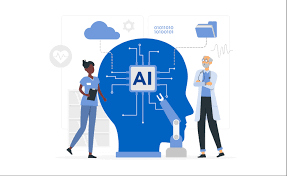The landscape of healthcare is evolving, and at the forefront of this revolution is Artificial Intelligence (AI). From case triage to patient care, administrative tasks, patient flow analysis, and the advent of virtual nursing assistants, AI is reshaping the way healthcare is delivered and experienced. Let’s delve into some key areas where AI is making a profound impact.
1. Case Triage: Prioritizing Critical Cases with AI
One of the critical applications of AI in healthcare is in case triage. AI aids clinicians in reviewing images and scans, helping them prioritize critical cases efficiently. By leveraging advanced algorithms, AI can quickly analyze diagnostic data, allowing healthcare professionals to focus their attention where it is needed most urgently.
2. Patient Care: AI Enhancing Personalized Healthcare
AI is proving to be a valuable ally in patient care. Through integration with Electronic Medical Records (EMR) and personal health records, AI enables providers to access medical data, review patient histories, and identify patterns. Innovations like Abridge software are making medical information more accessible to patients by automatically translating appointment summaries into plain English. Similarly, solutions like Virtuoso offer patients a single point of contact with the health system, providing access to health information and self-service features.
3. Administrative Tasks: Streamlining Operations with AI
The automation capabilities of AI extend to administrative tasks, offering significant efficiency gains. From pre-authorizing insurance and following up on unpaid bills to maintaining accurate records, AI takes the burden off healthcare professionals, allowing them to focus on patient care. This not only reduces the administrative workload but also minimizes the risk of errors associated with manual tasks.
4. Patient Flow Analysis: Predicting Service Demand
AI’s predictive capabilities are harnessed to analyze patient data, allowing healthcare facilities to anticipate demand for specific services. This enables better resource allocation, smoother patient flow, and improved overall operational efficiency. By identifying patterns in historical data, AI contributes to strategic decision-making, ensuring that healthcare providers can meet the needs of their patients in a timely and effective manner.
5. Virtual Nursing Assistants: Enhancing Patient Support
The advent of virtual nursing assistants powered by AI introduces a new dimension to patient support. These assistants can answer questions, monitor patients, and guide them to the most effective care settings. By providing real-time assistance and information, virtual nursing assistants contribute to improved patient experiences and outcomes.
Case Studies: Realizing Transformative Outcomes
Several healthcare systems have already embraced AI, showcasing transformative outcomes. For instance, the CommonSpirit health system deployed a text-based, AI-driven patient outreach and care coordination tool. This tool utilizes patient data and AI to predict care needs, refer patients to appropriate services, and coordinate their care effectively. The results are evident in improved care outcomes, reduced lengths of stay, and decreased readmission rates.
As we witness the ongoing integration of AI into healthcare practices, it’s essential to stay informed about the latest advancements. Patients are benefiting from more accessible information, personalized care, and streamlined administrative processes. The future holds even greater promise as AI continues to innovate and reshape the healthcare landscape.
In your next healthcare visit, consider asking your provider about the potential benefits of AI tools designed to enhance your experience and care. The future of healthcare is here, and AI is leading the way.



